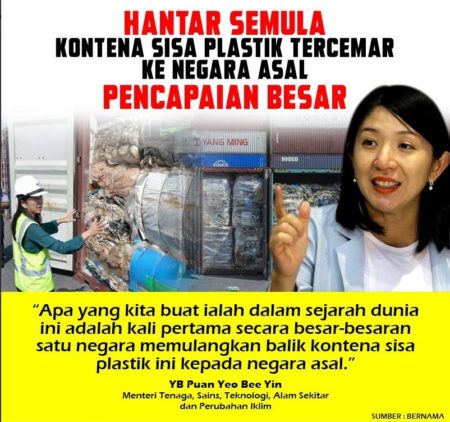Portsmouth city council has today (January 22) announced plans to ‘prioritise’ the recycling of food waste over plastics in the wake of 42 containers of plastic waste being returned to the UK by Malaysia.
On Monday (20 January) Malaysian environment minister Yeo Bee Yin said her government had repatriated 150 containers of ‘illegal plastic waste’ to countries across the world (see letsrecycle.com story).
And, Portsmouth city council says uncertainty over plastics recycling – as shown by the return of the containers – has led it to prioritise recycling food waste instead.
The council currently only collects bottles at the kerbside and defended its decision not to collect other plastics, claiming that the Malaysia story showed the material ‘may not ever get recycled’.
Portsmouth city council had a recycling rate of 25.5% in the 2018/19 financial year, way below England’s household waste recycling rate of 45.1%.
The council launched a food waste collection trial last September for 8,000 households in the city. Since then, it has recycled 175 tonnes of food waste under the scheme, reducing black bag refuse in the trial areas by nearly 20%.
Priority
“We don’t want to do what some areas seem to be doing and collecting plastic just to make people feel better”
Councillor Steve Pitt, deputy leader at Portsmouth city council, said: “Being greener is a key priority of the council and we are committed to do whatever we can to reduce waste and recycle more.
“I am delighted with the results of the scheme and impact it has had on reducing the amount of rubbish being put in black sacks.
“Plastic recycling is something we will continue to explore but we need to be sure that any materials we collect is able to be recycled effectively, we don’t want to do what some areas seem to be doing and collecting plastic just to make people feel better when it can’t actually be recycled.
“We urge people to think before they put rubbish in the bin and think whether it can be recycled.”
Recycling

Malaysian environment minister Yeo Bee Yin said her government had repatriated 150 containers of ‘illegal plastic waste’
Portsmouth city council says it is committed to sustainable recycling but that it does not prioritise plastic recycling.
A council statement said: “The council currently only recycles plastic bottles and this is because there are sustainable markets which reside in the UK.
“Other plastics which are not bottle shaped should go in with the rubbish because, along with other waste in black bins/bags, energy is recovered from incineration.
“Other areas may take a mixture of plastics, but as the latest news story about Malaysia sending back 42 containers of ‘illegal’ plastic waste to the UK shows, they may not ever get recycled and become someone else’s problem.”
Analysis
According to analysis of the council’s own, 40% of waste put into black bags by residents was food waste.
Of the total waste, 16.1% could have been recycled in green bins and 9.7% was plastics not collected by the council, given it only recycles plastic bottles.
Trial
During the food waste trial, residents in selected areas put waste food into kitchen caddies.
Instead of being incinerated and energy being recovered, this waste is recycled and turned into fuel and fertiliser.
The council says about 60% of households in the trial areas take part each week.
The food waste is transported in bulk to a plant in Bournemouth for treatment where it is converted into biogas and used to generate electricity, heat or transport fuels. A fertiliser is also created, which can be used in agriculture and land regeneration.
The council says that if it takes the decision to extend food waste recycling it will look at options to reduce transporting waste to be more environmentally friendly.
Blue Planet effect
Increasing awareness of plastic pollution both domestically and internationally has been credited to the 2017 BBC nature documentary Blue Planet II, an influence dubbed the ‘Blue Planet effect’.
In November 2019 it became possible for residents in Leeds to recycle pots, tubs and trays (PTT) and cartons via their kerbside collections (see letsrecycle.com story).
In August 2019 a petition from residents in West Berkshire forced the local council to debate its plastics recycling policy (see letsrecycle.com story).
And, in January 2018 former environment minister Thérèse Coffey wrote to Rotherham borough council urging the authority to rethink its decision not to propose kerbside plastic collection.
The post Portsmouth ‘prioritises’ food waste over plastics appeared first on letsrecycle.com.
Source: letsrecycle.com Plastic




